A First Look At Elysium Flare (A Fate Space Opera RPG): #1 Fate Variant Ruleset
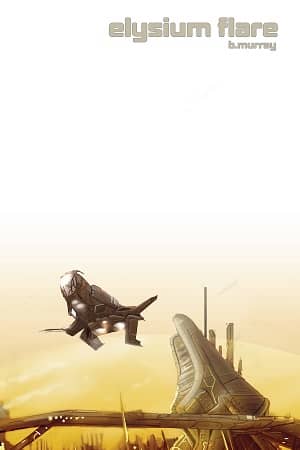
I know I shouldn’t have, but on impulse bought a new tabletop roleplaying game. Listen!
The Gulfs between the Arms are nearly empty of stars and difficult to navigate. In these places there are few civilizations but there are other things. In the Gulfs horrors lurk, sleeping for slow millennia until the fast bright minds of the civilizations come too close. As with the Rim, there are inhabitants of the Hub that believe these horrors can be harnessed or at least aimed and unleashed. This almost always ends badly. But if they can be tamed or at least directed, the power one might wield over the Hub worlds would be unstoppable.
Imagine a roleplaying game that put boots on the ground — or was it flippers? — in a the kind of wide-angle galaxy depicted by strategy games like Stellaris or Eclipse, or perhaps Twilight Imperium? Or Valerian and the City of a Thousand Planets, only good.
That’s what Elysium Flare promises to do.
Elysium Flare unapologetically emulates sweeping Sci-Fi Space Opera, cheerfully mixing magic (sort of) and science. In tone, it’s more Guardians of the Galaxy or Thor: Ragnarok than Rogue One. However, it’s not actually Starfinder‘s leaner more narrativist cousin; it has much stronger sense of galactic geography, which offers a quite different aesthetic.
Perhaps best of all for overstretched middle aged players like me, it seems to do it in a way that’s both “lite” and structured using an elegantly hacked-down Fate variant that’s narrativist — of course! — but still offers playable peril.
It’s also a delightful read — tellingly, I’m not the only person to use that term. It’s nicely illustrated without going over the top, presented in well-written and readable form, has an Index (ARE YOU READING THIS MONGOOSE???). I counted about three minor typos and I don’t know what the softback is like because it hasn’t arrived yet. It’s missing blank character sheets, but I believe these are on their way. So it’s pretty much what you’d expect from a mature “indy” games publisher
It comes from VSCA, the same team that made Diaspora, meaning mostly Brad J Murray and his mates on Google+. Though this is very different in both setting and complexity, the strengths have definitely carried over from one to the other.
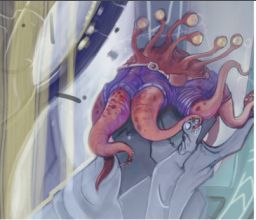
Elysium Flare uses a custom Fate variant as its engine.
Fate is easier to just play than to explain. ( I did try to to explain on Fate in an earlier article).
The Fate Point economy gamifies the metagame. Whereas, with other games, GMs may fudge a little to keep the PCs alive until the good bit, Fate has an actual mechanism to do this. As part of this, it formalises tags and descriptions into Aspects, which you can tag — at the cost of a Fate Point — in order to get dice modifiers. A typical interaction might be: “I use my Manipulation skill to persuade the custom’s officer to ignore the large meson cannon in our hold. I’ll tag my Cheeky Chappy aspect. (Hands over a Fate Point)…” Later, the GM might offer the player a Fate Point: “I think a Cheeky Chappy might think he could get away with this [bad idea].”
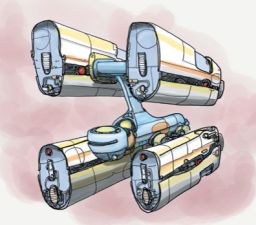
Fate is immensely flexible and scalable.
You can use the core rules to model just about any genre. The weakness is that it’s a genre you’re emulating, not a secondary world that you’re simulating.
The creative latitude is thrilling, but without the constraints of hard randomness, you can end up playing TV Tropes the TTRPG. Because of the collaborative micro world building — “This place has the aspect Party Town. I think we find a particularly wild party going on into the small hours (Offers a Fate Point)” — everybody around the table has to have some idea of the the genre in question. Ironically, simulationist games like Traveller are probably more reliable at producing originality, and require less genre savvy from players.
However, that weakness is also a strength.
For me, Fate is the hot chocolate to Traveller and that ilk’s coffee. It has its place when you want to sit by a fireside and spin Tales of High Adventure without cutting yourself on reality’s hard edges. (As with Hot Chocolate, children like Fate games — Fate Points are creatively empowering, and the meta game somehow makes people less self-conscious about engaging emotionally with the actual game — but are probably best not trying to produce them themselves.) There’s also a delight — there’s that word again — in seeing a genre deconstructed into a set of playable rules.
Which brings us to Elysium Flare’s Fate variant.
The game is compatible with Fate Core, and Fate Accelerated. However Brad Murray presents us with his hacked down version of the former. Collaborative character generation is in, tying the characters together using backstory — that’ll be fun. Aspects are there, as are Stunts. However, elegantly, Fate Point-powered stunts have gone. These are now just Aspects. Skills continue to represent a character’s attributes and abilities but in ways that are more tied together. Money is completely abstracted, there isn’t even a resources track! That’s always a bit of a head **** for people used to more crunch. It’s all nicely set out, but in a take it or leave it way: there’s no attempt to persuade you this is a good idea, a pity because no matter how bought-in the GM is, it’s useful to have some articulate canned responses to confused players.
What there is is some splendid advice on handling checks — dice rolls to do stuff — without resorting to boring or game-halting succeed/fail situations. For example, maybe the PC succeeds regardless of the roll, but a with complication-adding collateral damage, to themselves, their friends, or their bank balance, depending on the context.
So far so generic. It gets less generic in the areas where it’s tailored to Elysium Flare‘s story world.
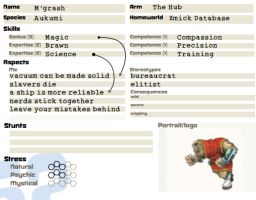
Obviously, the PCs gain aspects from their race — there are six very cool species, including some very alien playable aliens. However, skills are handled at right angles to what you might be used to.
There’s a general assumption that PCs have the basic skills of their culture. So, instead of the usual “Pilot”, “Shoot” etc, etc, you have more trait-like skills: Brawn, Precision, Evasion, Compassion (doesn’t have to be used compassionately), Commerce, and Manipulation (of people). You apply the one that matches the situation, so Precision lets me shoot but also repair a burned out psychic modulator.
Another skill, Training, covers “following procedures unimaginatively” and seems to work in the same way as Careers do in Barbarians of Lemuria: pretty much a stand in for character class.
I say “seems” because there isn’t quite enough guidance for this potentially game-breaking skill, nor is Training mechanically limited by being tied to an Aspect or Phase of back-story. Sometimes, especially with less experienced or more instinctively competitive players, you can have too much flexibility! However, this is easily house-ruled. (I’ll tie it to an Aspect or Phase, and use it as a pre-requisite for certain tasks — “You’re a trained ground soldier! You have no idea how to fly a space ship” and a hindrance for more exciting ones “Setting up defences for an entire company of soldiers is difficulty 3 and you have Training (ground soldier) 1, so take -2 on this roll”.)
Then, even more specific to the setting, we have the Physics skills: Science, Psionics and Magic, each tied to an Aspect and with a matching stress track. This trio of Physics is how the Elysium Flare universe works. You can, for example, have a ship with a Psi drive, and a gun that shoots magic — and it’s all handled using Fate’s simple, recursive rules.
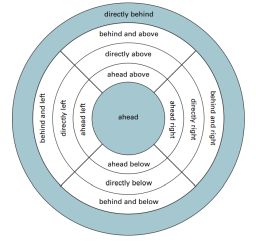
As well as Aspects, you are linked to an Association, for example:
Religious
There is proof that your philosophy is wrong.
Remit: owned by its membership, the organization is dedicated to perpetuating and expanding belief in their philosophy or mythology.
Specifier: the organization caters to or is an arm of a religion. This might be a mystical science or it might be complete nonsense.
The Association is a source of missions, and can also be tapped for equipment and back up. Also, people may try to kill you. (More on Associations when I talk about the story world).
Basic equipment comes free. More powerful equipment — including ships — needs one or more “have a thing” stunts. Each item is treated as a character in its own right, with aspects and stunts, backstory and — for the higher tier kit — a Recognition track. When that fills due to you “succeeding with style” — and once you can no longer mitigate it with Consequences — then you can be taken out of the adventure due to attention from mobs of tourists or perhaps cultists — think Life of Brian. Everything has a Physics, so my armour may protect me from psi attacks, but my gun may shoot solid slugs.
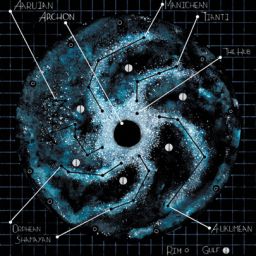
Talking of shooting, ground combat is still a minigame, more structured than in Fate Core, but simpler compared to Diaspora. Zones are in, with Clutter standing for difficulty of crossing and ease of finding cover. There’s no weapons or armour listing: it’s usually enough to know Physics and (for the weapon) optimum Range, though some NPCs will also have weapons with stunts.
I’m not quite sure how I feel about this. On the one hand, I’m ecstatic to not have to handle lists and lists of guns. On the other, I could have done with some sample weapons. Also, how about rules for the kind of heavy weapons likely to be deployed against the characters? Yes, I know I can houserule these. Even so.
Space combat… space combat looks to be a hoot. I can see my kids enjoying this. Actually I’ll enjoy it too.
In what feels like a throwback to old arcade games, you handle it from the PC’s perspective and shift enemy ships around in a “reticle.” This is very much a minigame, but — hopefully — justified by the flavour it adds. We shall see. (Space travel is part of the setting: I’ll talk about that next time.)
Taken as a whole, Elysium Fare‘s underlying Fate build does an admirable job of picking parameters from which the Space Opera play style should naturally emerge, and of grounding the character generation and game mechanics in the galactic setting.
Thus we don’t really care whether you have a Mk 3b laser shotgun with scope and silencer, we do care that you have the famed Psychic Spear of Qang. Play should segue naturally from confrontation to battle, and battle will still be grounded in character. Meanwhile characters can point to the approximate location of their home worlds on the galactic map, and the chosen Association nudges them into particular sorts of adventures while providing the GM with a good jumping off point.
All that under-the-hood stuff would be enough to justify my impulse purchase. However, as an author, what really impresses me is the game universe with its baked-in conflict, and the handling of galactic geography and space travel. I’ll get to that next time.
You can get Elysium Flare on DriveThruRPG. As always, get the PDF as well as the softback, since you’ll want to print material for the players.
M Harold Page is the Scottish author of The Wreck of the Marissa (Book 1 of the Eternal Dome of the Unknowable Series), an old-school space adventure yarn about a retired mercenary-turned-archaeologist dealing with “local difficulties” as he pursues his quest across the galaxy. His other titles include Swords vs Tanks (Charles Stross: “Holy ****!”) and Storyteller Tools: Outline from vision to finished novel without losing the magic. (Ken MacLeod: “…very useful in getting from ideas etc to plot and story.” Hannu Rajaniemi: “…find myself to coming back to [this] book in the early stages.”)